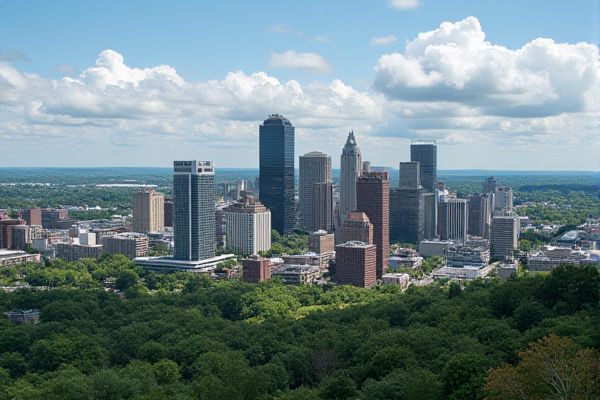
Transportation and commuting in Massachusetts: MBTA offers extensive public transit options. Commuter Rail connects Greater Boston areas. Boston traffic can be heavy, especially rush hour. CharlieCard for discounted public transportation fares. Logan Airport is major international hub. Zipcar and car-sharing services widely available. Biking is popular with dedicated bike lanes. Limited parking in urban areas. Massachusetts Turnpike requires electronic tolling. Ferry services connect coastal communities.
MBTA offers extensive public transit options.
The Massachusetts Bay Transportation Authority (MBTA) offers extensive public transit options in Greater Boston, including subway lines (Red, Orange, Blue, and Green), bus routes, Commuter Rail lines, ferry services, and paratransit services, providing comprehensive connectivity across eastern Massachusetts and parts of Rhode Island. To learn more about navigating these options, you can visit their website, which provides detailed guidance on riding the MBTA. This integrated network not only facilitates ease of travel within the city but also extends its accessibility to nearby regions, making it a crucial component of local infrastructure.
Commuter Rail connects Greater Boston areas.
The MBTA Commuter Rail serves as a vital link connecting communities across Eastern Massachusetts and Rhode Island to Downtown Boston. With an extensive network that includes 137 stops and 12 routes operating every day of the week, it offers seamless connectivity through its terminals at North Station and South Station, facilitating easy transfers to other transit services. The system is designed with multiple fare options, adjusted schedules, and ambitious plans for improvements such as electrification and increased service frequency. To learn more about this essential transportation network, visit their comprehensive MBTA Commuter Rail Guide for detailed information.
Boston traffic can be heavy, especially rush hour.
Boston traffic is among the worst globally, with drivers losing about 134 hours in traffic in 2022. Rush-hour speeds can be as low as 11 mph near Downtown, highlighting significant congestion and economic impacts. For more detailed insights, you can visit the Boston Traffic Congestion Report on CBS News.
CharlieCard for discounted public transportation fares.
The CharlieCard is a contactless smart card widely utilized for discounted public transportation fares in the Boston area, including additional regional transit systems across Massachusetts. This card provides significant benefits, offering discounts particularly for senior citizens, disabled individuals, and students. Holders of the CharlieCard enjoy seamless access to the MBTA's subway and bus networks, as well as services provided by several regional transit authorities. For more detailed information about the features and benefits of the CharlieCard, you can visit the official page on Wikipedia.
Logan Airport is major international hub.
Boston Logan International Airport (BOS) is a Major International Hub, handling over 40 million passengers in 2023, with four terminals serving various airlines and routes. It offers multiple ground transportation options, including MBTA ferries, buses, and trains to access downtown Boston and surrounding areas. For more detailed information, visit the Upgraded Points website to explore various travel tips and options available at this bustling airport.
Zipcar and car-sharing services widely available.
Zipcar and other car-sharing services, such as Getaround, are widely available in Massachusetts, particularly in Boston and Cambridge, offering residents an alternative to personal vehicle ownership by providing access to cars for short-term use, reducing congestion, and promoting more sustainable transportation options. For more detailed information, you can visit the Car Share Boston website.
Biking is popular with dedicated bike lanes.
Biking is increasingly popular in Massachusetts, supported by a comprehensive network of dedicated bike lanes and trails, including the Priority Trails Network vision map which outlines over 320 miles of existing trails, trails under construction, and proposed paths to enhance the statewide transportation infrastructure. Separated bike lanes, such as those in Cambridge, have shown significant success in increasing bike usage and safety, with studies indicating a substantial rise in ridership following their installation.
Limited parking in urban areas.
Cambridge has abolished minimum parking space requirements in its zoning code, citing declining car ownership and the need for more open space and housing, making it the first Massachusetts city to do so. This shift in policy aligns Cambridge with other progressive cities like Minneapolis, San Francisco, and Nashville. For more detailed information on this transformative urban planning decision, please visit the article on The Crimson. By eliminating these requirements, Cambridge aims to prioritize community well-being and sustainable development.
Massachusetts Turnpike requires electronic tolling.
The Massachusetts Turnpike, commonly known as Mass Pike, has successfully transitioned to all-electronic tolling (AET) via the innovative EZDriveMA program. This modern system eliminates manual toll collection, replacing it with advanced overhead toll gantries that utilize E-ZPass transponders or license plate capture imaging to efficiently collect tolls. This transition significantly enhances safety and convenience for drivers while also reducing operating costs. To learn more about this modernization project, visit the CDM Smith MassDOT All-Electronic Tolling webpage.
Ferry services connect coastal communities.
The Massachusetts Department of Transportation (MassDOT) is undertaking an extensive 18-month study aimed at evaluating and planning for the expansion of ferry services. This initiative emphasizes creating fully ADA accessible routes to better connect coastal communities including Gloucester, Salem, Lynn, Winthrop, Quincy, and various Boston neighborhoods. A major focus of the study is on community engagement and environmental justice, ensuring that the voices and needs of local residents are prioritized. To learn more about this significant transportation development, you can visit the Massachusetts Department of Transportation's study on ferry service expansion.
